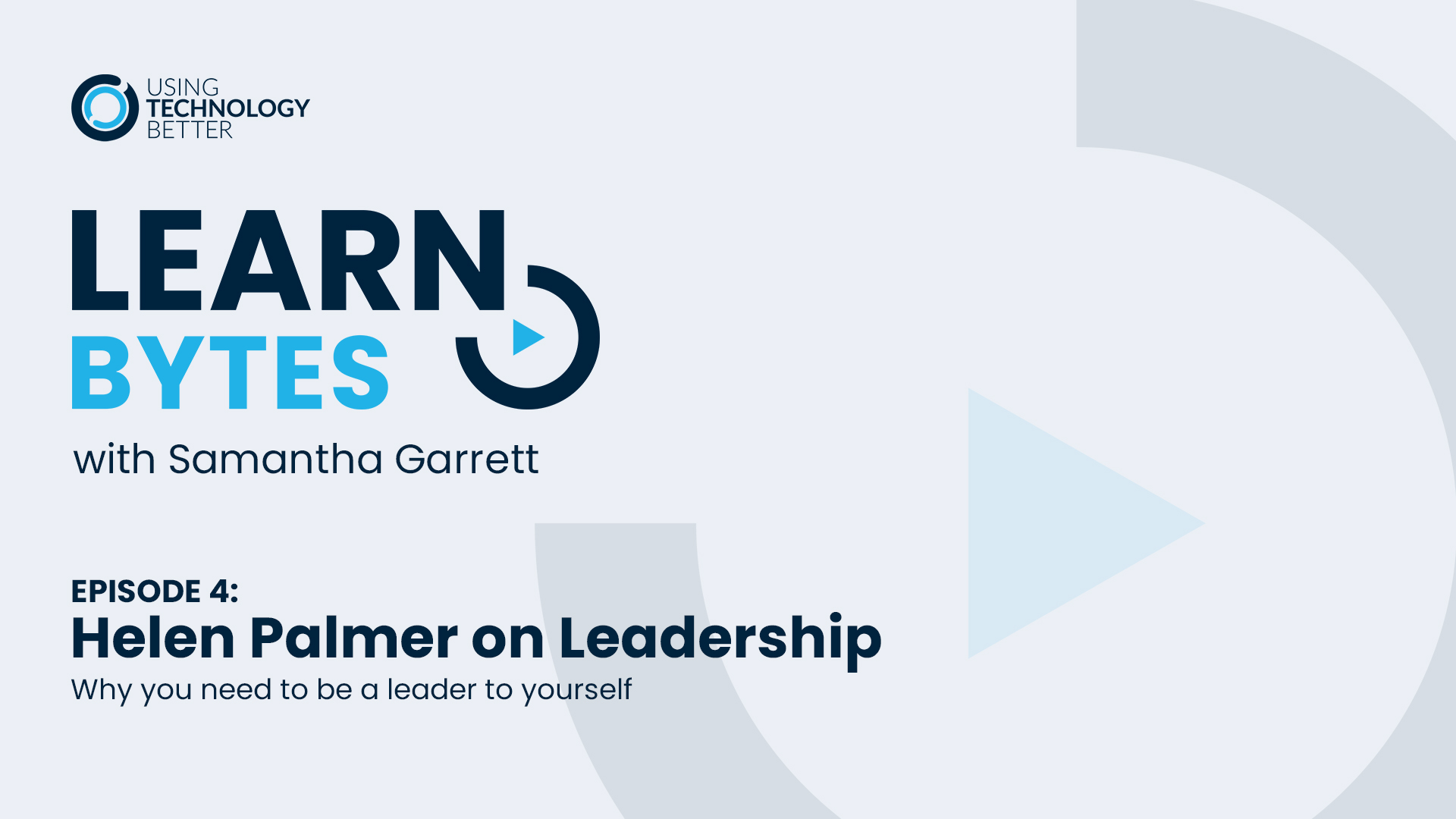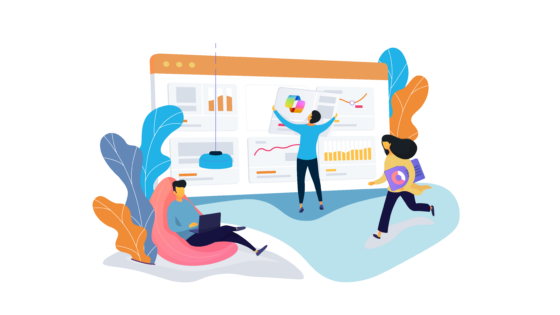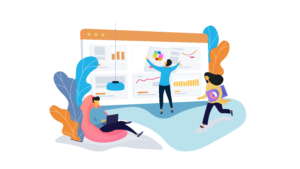Get notified of future episodes: YouTube playlist | Apple Podcasts | Stitcher | Spotify
Connect with the show on Instagram: @LearnBytes
In this Episode:
Samantha is joined by Helen Palmer, the creator and founder of SelfUnlimited – a fresh perspective on how to navigate the world of work.
In her race against the clock, Helen shares why we need to be a leader to ourselves. We also hear about how managing perception versus reality and having the wisdom to know when you can’t change something have been her biggest leadership lessons.
You can connect with Self unLimited via their website, blog and monthly newsletter.
Get in touch with Helen at helen@questo.com.au or connect with her on LinkedIn (listen to the episode to learn why you need to send her a personal message when you connect!).
Links from the episode:
Helen’s book recommendation is Let Your Life Speak by Parker J. Palmer.
Sign up for our newsletter, packed full with strategies to help you live your most efficient, productive & organised life.
https://utb.fyi/join-newsletter
Watch it now
Transcript:
Samantha 0:03
Welcome to LearnBytes, the show that delivers byte-sized pieces of wisdom so you can learn how to increase your efficiency and productivity, embrace your natural creativity and lead with impact. I’m Samantha Garrett from Using Technology Better and joining me on the show today is Helen Palmer. Welcome, Helen.
Helen Palmer 0:20
Great to be here.
Samantha 0:21
Thank you so much for joining us. So Helen is the creator and founder of Self Unlimited, a fresh perspective on how to navigate the world of work. So it’s part of Helen’s mission to enable people to have a better experience of work, which I totally love.
Helen Palmer 0:36
Too right. Who wouldn’t want a better experience of work?
Samantha 0:39
Exactly. That’s it, totally everyone would, I don’t think I’ve ever met someone that goes, No, I want a worse experience of work.
Helen Palmer 0:47
Probably they’re like I want out of work and retire easy, but I’ve got some thoughts on that, too.
Samantha 0:51
Oh, cool, we may hear that, because Helen, today is going to share her wisdom on the topic of leadership. But before we get into the questions, Helen, I’d love you to share a bit about yourself what you’re passionate about. And also, Helen’s got a very unique perspective on leadership for us today, which I’m excited to hear. So maybe you can frame that up a little bit too.
Helen Palmer 1:10
Sure. Passion, I don’t have one, I’m really problematic like that. Think of me like a bee that jumps from flower to flower. And when the nectar is flowing, my passion could be whatever that nectar is. But having said that, broadly speaking, that phrase that we just used, having a better experience of work is definitely where it’s at. And that kind of has been something that holds together the narrative of everything I’ve done from when I first started working the age 17 until now and working in my own business. And that’s both because I’ve seen people who’ve been affected by changes going on at work, and it really kind of hits their sense of identity. And then it can either lock up their potential or lock up the good energy. And so I love it when people can get unlocked, unblocked, and then sometimes it can just be because of a smaller epiphany, you see this look on their face, like, Oh, this, this could be different and I’m like, yes, you didn’t realize there was a possibility. So whenever I can present somebody with a possibility they didn’t consider or a possibility that’s now available to them because something that was blocked or locked up or unrealized is now enabled to come out into the world. And it ties back to, in particularly for me, that’s in the context of work and having a better experience of work. Sometimes, too, for people back to the leadership thing, their experience of work is I have a crappy leader. I don’t like the person who’s leading me. And research indicates that actually, only one out of 10 people is the right person to be in leadership. So that suggests there’s a large number of people who are not necessarily in the best and just to flesh out that thought three could get there of the ten with the right or with a bit of training and mentoring. Another three could get there with a lot and three are not the right person to be there at all, which actually leads into the idea of leadership that I have. It’s about leading yourself. Because yes, it’s good to have a leader and an organization or a context that you want to follow. But if you’re one of those, nine people who’s got those nine leaders who really quite aren’t up to par, well, do they kind of well give up or have a terrible experience of work. And I think there’s the possibility to think, well, what was I looking for from that leadership? Maybe I can get that for myself, maybe I can create that for myself. So that’s the context of leadership and a little bit about my passions.
Samantha 3:29
And that is super fascinating. And I’m so glad that you’re gonna focus on that leading yourself because I’m imagine there’s some people that are watching and going, Oh, my gosh, I want to face like, nine out of 10 people with a terrible leader, what do I do? Is all hope lost? hope
Helen Palmer 3:42
So I have some hopre for you. I have some hope.
Samantha 3:47
I am lucky. I am like one of the one in ten with an amazing leader, but I’m very interested to hear. So. All right. So Helen, as you know, the show is all about bite sized pieces of wisdom, which is really a challenge for us not to talk too much, which is always which is always difficult. But we’re going to put the timer on.
Helen Palmer 4:03
Yes.
Samantha 4:04
Four minutes, eight questions.
Helen Palmer 4:06
Yep.
Samantha 4:06
If we get through them all, and you can shoot me a question at the end. We’ll see how we go.
Helen Palmer 4:11
I’m feeling quite competitive now and I’m a bit of a high achiever so I’m going to try and get all eight in four minutes.
All right, no, and I’ll give you a warning about 30 seconds, whenever is a good time to interrupt. So , yeah. So. I’ll start it now. And I’m going to go over. Are you ready?
Yes, bring it on.
Samantha 4:26
I’ll click start. Frist mobile phone and current phone?
Helen Palmer 4:30
I think it was a Nakia, it was so many years ago now. But now I’ve got a Samsung Galaxy and I got it because of the camera. But I wish I had the HTC I had before and because it was actually been designed.
Samantha 4:42
What is the most important quality for every leader to have?
Helen Palmer 4:45
Knowing what are your strengths and leading from that point of view of your strengths, owning that leading into that. You can’t be all things to all people so know who you’re going to be and be that.
Samantha 4:56
What do you find most rewarding or challenging about being a leader?
Helen Palmer 5:00
Well, when it’s leading others, it’s actually recognizing that the actions that I take can actually have a positive or negative impact on their life. And so the reward is actually seeing when that change happens. When I’m leading myself, it’s actually about setting some reasonable expectations. Because as I said, I’m like a high achiever. And so it’s kind of like keeping it in some manageable sets of constraints.
Samantha 5:23
What’s one thing you tell yourself when facing uncertainty?
Helen Palmer 5:27
I’m gonna learn something. I’m not actually unfazed by uncertainty, I always think of it it’s a space of possibility and potentiality.
Samantha 5:35
I love that because that just go so well with the show, because it’s really about the concept of learning and learning being a journey and a lifelong thing.
Helen Palmer 5:43
Absolutely.
Samantha 5:44
So that just fits perfectly with that. Yeah, you were doing so well, my goodness, we might have to, have to add more! Biggest leadership lesson learnt so far?
Helen Palmer 5:54
The difference between perception and reality, and that people will make choices based on perception rather than reality. And I remember being on learning this many years ago, where my staff saw me swanning around in the staff club, having cups of tea, and they thought I was swanning around. But in fact, I was actually having important meetings. But the perception was Helen’s slacking off, whereas in fact, that wasn’t my reality. So actually being clear about what the reality is in closing that gap if people have the wrong perception of what’s going on.
Samantha 6:25
Interesting. All right, if there’s one person you could spend an hour with, who would it be and why?
Helen Palmer 6:29
Unusual choice, potentially. It’s Melinda Gates. I’m fascinated, this is the wife of Bill Gates, I’m fascinated about how she has been on her own journey, partnered with one of the most, you know, famous and rich people in the world, and what it has been to carve out her own interests and her own identity, while also supporting Bill and their foundation and the things they do. And I’m loving the fact that they are more altruistic, and thinking about how their, the funds they have at their disposal can do very powerful things in the world, good change.
Samantha 7:00
That’s really fascinating. We might dig into more of that. We’ll move on for now. Question seven, yay, a minute 23.
Book, video or podcasts that you would recommend to others?
Helen Palmer 7:09
It’s a book called Let Your Life Speak. And it’s by a guy named Parker Palmer, who has no relation to me at all. He’s actually a Quaker, of the religious belief. And what I love about this book is he talks about the notion of vocation, which comes from the original word about like voice. And so that’s what’s the voice inside you that wants to express itself in the world. Now, it’s a really short book, and it’s got some really good wisdom about self care in there. And I’m often quoting some of his quotes around the idea of the self care isn’t a selfish thing. It’s the thing that enables you to express the best version of yourself to help others in the world.
Samantha 7:49
I love that I hope we’ll come back to that. How will you use your leadership skills to make a difference to the world? 35 seconds.
Helen Palmer 7:55
Role modeling myself, particularly with the leading yourself through the selfUnlimited idea, because as I said before, it’s about unlocking other people’s potential and liberating them to have a better experience of work. So as much as I can put the message out in the world and be a role model of actually living that.
Samantha 8:11
Yeah, brilliant. Thank you. So you got 15 seconds, you can either ask me a question or elaborate on any of the answers.
Helen Palmer 8:17
Ah, well, from a leadership point of view is I think inspiring people to actually be that leader to themselves and not looking and think oh my goodness, I got one of those terrible nine leaders was like, oh, I’ve got some agency, I could do something about it, how will I lead myself and they might then be a role model to people around them to actually have some positive change in the world.
Samantha 8:37
Yeah that’s so fascinating isn’t it, because at the end of the day, we, we have the choice. And I always think, you know, I have read someone and I am going to quote it wrong. But basically, the idea is, if you don’t like the situation, you either leave it, accept it, or try and change it. And I was thinking, you know, the work you do very much works in that trying to change it part of it, like, Oh, you might note be able to change your crappy leader, or whatever, or the culture in your organization. But if you’re not in a position to leave, and you’re choosing not to leave, then what are you going to choose to do to improve that?
Helen Palmer 9:08
You might be thinking of the quote, that Serenity Prayer, you know, Lord, grant me the serenity to accept the things I cannot change, courage to change the things I can and wisdom to know the difference. I’ve always struggled with that wisdom to know the difference, because I’m very much a believer in that things can change. And the things I can change might not be about, you know, others, well definitely I can’t control others. But I might be able to control my attitude, I might be able to control how I think about a situation. So finding those moments to change. But because I have such a belief in the power of change, and that the decisions you make to change, sometimes it can be really hard to sit back and go. Yeah, this is one of those moments where I need to exercise wisdom. It’s not something I can change. I can maybe influence something or I can put something into the situation but then I just have to go, it will be what it will be and that’s I did what my best I contributed what I could and other circumstances and other people, it’s now over to them and what they might do. And I just have to let it be. So I guess it’s another lesson I’ve actually learned too as much as you might think, well, if I just do the right things at the right moment at the right time, it’s all going to flow and happen is there’s a point we just have to go. It is what it is, it will be what it will be. And I did my best.
Samantha 10:22
Yeah, that’s a really important point. Because otherwise we can just keep banging our heads against the wall. But feeling that it’s our, that it’s because we’ve not done enough, you know, that we can never change someone else. And I love that, that you use the word influence there. Because often, I mean, there is a difference between changing and influencing. And if we’ve influenced to the best we can, that’s, you’re right, then we just have to go Well, yeah, that’s what the situation is. Yeah, super fascinating. Thank you. And that book? I have not heard of that. And that sounds so interesting. I will put the links below for everyone to look at.
Helen Palmer 10:58
Yes, yes, very happy to share with it. And then the guy because of maybe his Quaker background, just when you read it, I just feel like this is calm comes over just his phrasing and his wording. And it’s, it was just, it’s almost a treat to kind of just go into it and think about and reflect on it. And it literally is one of those squares, small books. And And And like I said, when I say small, it literally is small, but it’s also not deep in volume, which kind of you just have a feel like you don’t even think, oh, my goodness is another 200 pages to go even though you might think this is good stuff. There’s just something about the lightness of it that comes through that I think is in itself a message about you know, letting the voice speak, he literally is leaving his voice speak and how he’s coming through about that notion of finding the flow and for yourself.
Samantha 11:45
That’s super cool. Thank you. Well, this has been great. I really enjoyed itand your, your high achiever came through, you beat the clock.
Helen Palmer 11:53
Thank you. Thank you.
Samantha 11:55
Yeah, you can, we can relax now. So. But one last thing though, before you can relax. Before we go. I’d love you to let everyone know where they can find you and your work and self Unlimited and how they can connect.
Helen Palmer 12:06
Sure, so Self unlimited has a website, which is www.be–selfunlimited.com. And that website’s got lots of resources that people can look at with stories and articles to read. If they are wanting to be alerted to those, they can subscribe to the newsletter and something will come out once a month. I’m not sure when you’re releasing this. But it’s usually the second week of the month that the newsletter comes out. So if you can look for something in the second week of September, there are social media channels for Self unLimited, and LinkedIn and Twitter and Instagram and Facebook, I think I’ve covered them all. And the people on Twitter, you can follow me, you can follow me on LinkedIn and Twitter. So one thing I will say is if people are thinking, Oh, I’d like to reach out and connect with her on LinkedIn, something to know, it is important that you put a personal message, because if you just send me an invitation with no message I’m going to hit ignore. Because I’d really like to take a stand on this. I’m a person, treat me like a person. And I sometimes say to people, when you walk into a room of people run up to me, give me your business card and walk away without talking to me. No. So if you want to send a connection request, stop, take a moment, introduce yourself, put a little message in and treat me like a human being. And then I’m very happy to accept but yeah, you send me a connection, anybody sends me a connection request with no personal message, ignore is the response you’re gonna get.
Samantha 13:35
Wow, do you know what, that never crossed my mind. And but I really, really like it because it does make complete sense. And know thinking about that Helen, and I actually, after I did a big event recently, I had a lot of connection requests where people wrote personal notes. And it was the first time it ever happened. But you know what, it actually felt really, really nice. And I didn’t put my finger on it at the time as to why but I was like, I’m definitely connecting with you, you’ve totally made an effort. But yeah, so that’s really good advice, thank you.
Helen Palmer 14:01
It’s kind of funny, because you think a connection, they made a human connection with you, it did not do that. It’s just a technological connection. And I kind of almost feel it’s like the equivalent of I’ve just become another notch on your networking bed post kind of thing. And it’s like, treat me as a human. I’m a human, you want to be connecting with me as human, let’s do it at the human level.
Samantha 14:19
And particularly too because sometimes I get random requests from people that I can’t understand why they want to connect with me, but there might be something completely valid. So if you’ve got, I mean, even if you’re watching this, and you’re like, I want to check Helen out, you can put in like I saw you on the show with Sam
Helen Palmer 14:31
Absolutely, provide the context. Yeah, yeah, yeah. And then that’s it well, too, with the COVID, who wouldn’t want some kind of nice little message or something added and we can respond to that, like I heard that and it made a difference so that you this thing that you said was really interesting, or by the way I know somebody that we have in common and you know, I value them. So I think anything that you can do to put a little more goodness in the world. Let’s do it.
Samantha 14:55
Do it. I like it. I am going to join that stand with you and I’m going to make a personal message
Helen Palmer 15:00
Ah, well there you go change made, tick.
Samantha 15:02
One bite sized piece at a time! I just couldn’t resist.
Helen Palmer 15:08
Go for it.
Samantha 15:09
Lovely. All right. Well, thank you so much once again. And thank you everyone for watching. So, if you like the conversation I have had with Helen today and you want to see more, make sure you subscribe to the Using Technology Better YouTube Channel. Or if you’re listening to the podcast version of the show, then you can follow it on your favorite podcast platform. And you’ll get notified of all the new episodes. Plus, as you may know, we have the little friendly fortnightly newsletter where I write to you sharing tips about efficiency and productivity and organisation, all the things I get nerdy about.
Helen Palmer 15:42
And it’s good stuff too.
Samantha 15:44
Thank you. As is yours, so there are two newsletters for you guys to sign up. Thank you Helen. Um, so yeah, definitely. There you go, you’ve got Helens approval on the newsletter.
Helen Palmer 15:55
Thumbs up.
Samantha 15:57
Sign up to that too. I’ll put the link below. So that is it for the show today. But I will see you again very soon for another bite sized piece of the learning adventures that is life, so we will see you then. Bye.
Helen Palmer 16:09
Bye.
Samantha 16:11
LearnBytes is brought to you by Using Technology Better, we’re all about tech training delivered differently. If you want to solve your tech frustrations and become more confident, efficient and productive with the tools you use every day, then head on over to www.usingtechnologybetter.com to get the training you need to be awesome.











